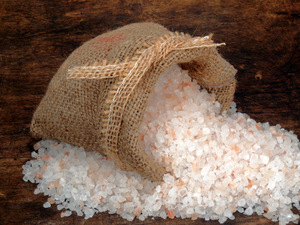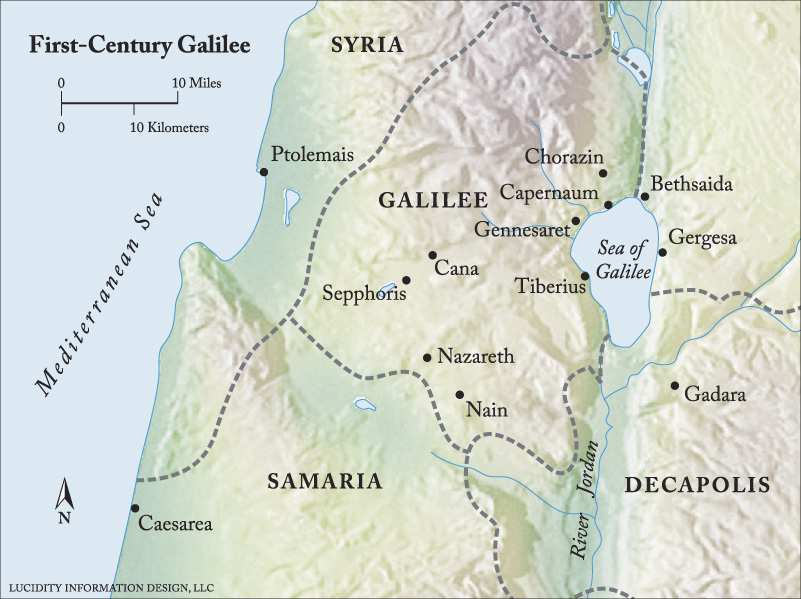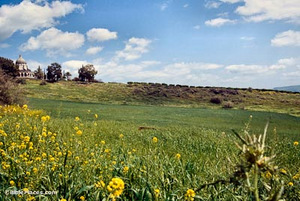 An old friend recently began teaching about a passage from Matthew:
An old friend recently began teaching about a passage from Matthew:
"You are the salt of the earth; but if the salt has become tasteless, how can it be made salty again?" (Matthew 5:13)
Knowing about my interest in the Hebrew/Jewish perspective of things, he asked if there was anything in particular I knew about that verse. I did not... but I set out to study the passage to develop a better understanding of it.
I began with the three basics: context, context, context! :)
The Back Story
What are the events that led up to our passage?
Yeshua was led up by the Spirit into the wilderness and was tempted by the devil. (Matthew 4:1-11)
He withdraws into the region of the Galilee (see map) after John is taken into custody. (Matthew 4:12-16)
He then takes up John's message and preaches, "Repent, for the kingdom of heaven is at hand." (Matthew 4:17)
He selects and calls the Twelve to become disciples. (Matthew 4:18-22)
He goes throughout the Galilee, teaching in synagogues and healing the sick. (Matthew 4:23-24)
Large crowds from Galilee, the Decapolis (see map), Jerusalem and Judea (south of the map) follow Him. (Matthew 4:23)
It is in this context that the Master goes up on a mountain and begins teaching. The parallel passage in Luke 6:20 says "And turning His gaze toward His disciples, He began to say..." (emphasis mine).
When He was speaking, His focus was not on the crowds but on His disciples.
The Words
Now, let's look at what Messiah says in its broader context:
You are the salt of the earth; but if the salt has become tasteless, how can it be made salty again? It is no longer good for anything, except to be thrown out and trampled under foot by men.
You are the light of the world. A city set on a hill cannot be hidden; nor does anyone light a lamp and put it under a basket, but on the lampstand, and it gives light to all who are in the house. Let your light shine before men in such a way that they may see your good works, and glorify your Father who is in heaven.
Do not think that I came to abolish the Law or the Prophets; I did not come to abolish but to fulfill. For truly I say to you, until heaven and earth pass away, not the smallest letter or stroke shall pass from the Law until all is accomplished. Whoever then annuls one of the least of these commandments, and teaches others to do the same, shall be called least in the kingdom of heaven; but whoever keeps and teaches them, he shall be called great in the kingdom of heaven. (Matt 5:13-19 NASB)
The Study
To whom is He speaking? The twelve disciples.
There were no "Christians" at this point in history nor were there any recorded Gentile believers. He was speaking to the twelve disciples who are all Jewish men. So we must consider how twelve, first-century Jewish men would have understood the words of Christ.
Where is He speaking? "The mountain" in Galilee is not specifically identified in Scripture but the traditional site of Mt. Eremos is a reasonable possibility given that it fits with both the description of "the mountain" in Matthew's gospel (Matthew 5:1) and "a level place" from the parallel passage in Luke's account (Luke 6:17).
When was this said? This is likely towards the middle of Messiah's ministry after He had been with the disciples for several months. Examining the parallel Gospel passages indicates that Yeshua chose His disciples, performed His first miracles, cleansed the Temple of the money changers, spoke with Nicodemus, and then began His ministry after John was imprisoned.
What was the meaning?
As noted above, Messiah was speaking with twelve, first-century Jewish men. What meaning did His words convey to them?
"You [plural] are the salt [singular]"
First, He was addressing them as a group of individuals [plural] with a [singular] shared purpose.
"Salt" brings to mind the well known metaphor of a "preservative": something that preserves. Salt was also used for medical purposes as a disinfectant and skin conditioner. Salt was used in Jerusalem in the Temple, not only as part of the daily sacrifices, but also during icy or wet weather on the Temple steps and ramps to keep people from slipping. Salt was a widely used and highly valuable commodity!
What else did "salt" bring to mind for Jesus' Jewish disciples? Frank Stern addresses this question in his book, A Rabbi Looks at Jesus' Parables:
One incident, known to Jesus' audiences, dramatically acknowledged the life-giving and preservative qualities of salt. The inhabitants of Jericho had complained bitterly to Elisha that their water was tainted. As a result, they could grow no crops. The prophet tossed salt into the spring, made the water wholesome, and prevented further "death and miscarriage". [2 Kings 2:19-22]
Jesus taught his listeners that, like salt, their influence would bring healing and hope to the communities in which they lived. By their behavior in their homes and along the streets of their villages, those who followed Jewish teachings could affect life-giving changes in the lives of their contemporaries. Those in his audiences who believed were "the salt of the earth." Like the prophet Elisha, Jesus was tossing them into the world to make it wholesome. 1
Stern connects "Jewish teachings" with being "salt" but is this accurate? Let's continue... [or cut to the chase if you can't wait! :) ]
"You are the salt of the earth"
The whole planet earth? No.
This passage literally reads "You are the salt of the land" [Greek: γης - gis (sounds like geese)]. Did Messiah mean the dirt? No.
When you say "the land" to a Jewish man, he immediately thinks of the Land of Israel: the nation. Jesus was telling the Twelve, "you faithful, believing men will serve to preserve this nation". Recall the story of Abraham beseeching G-d to spare the cities of Sodom and Gomorrah if only ten righteous men could be found there. The faith and righteousness of the disciples would stay the Almighty's hand of judgment against the entire nation of Israel.
When did this "saltiness" begin?
Did it start just then as Christ spoke those words? No.
It began in Numbers 18 with the "covenant of salt" (v 19) made between G-d and the Israelites. When Jeroboam rebels against the king Rehoboam, Abijah rebukes him and reminds him that this "covenant of salt" had been given to David and his descendants (i.e. Messiah) forever!
Do you not know that the LORD God of Israel gave the rule over Israel forever to David and his sons by a covenant of salt? (2 Chr 13:5)
Messiah has a "covenant of salt" as a descendant of King David. Indeed, Yeshua is the King of Israel! These Jewish believers in Messiah are the "righteous remnant" (Romans 11) for whose sake G-d preserves Israel and the world.2 What is the responsibility of the king? The king should rule justly and act mercifully and bring forth G-d's holiness from the nation.
"...but if the salt has become tasteless, how can it be made salty again?"
This phrase is generally understood as "if the preservative no longer preserves, how can it be serve its function again?" but the word "tasteless" doesn't really mean "lacking in taste or flavor". The phrase literally says "but if the salt has become foolish" [Greek: μωρανθη - moranthee - foolish, dull, or stupid]. If the salt becomes foolish then it isn't doing its job. So we find that the opposite of "salty" is "foolish"... being "salty" means "being wise". The Proverbs frequently speak of the opposites of "the wise" and "the fool" but they aren't speaking of someone who is a fool in the sense of being "goofy or awkward". The Proverbs use "fool" in the sense of someone who is ethically corrupt. Indeed, we often see Messiah condemning the leaders of His day for their hypocrisy and moral bankruptcy:
"Woe to you, scribes and Pharisees, hypocrites, because you devour widows' houses, and for a pretense you make long prayers; therefore you will receive greater condemnation." (Matthew 23:14)
The leaders and rulers of His day were truly corrupt and were unfit to lead the nation of Israel. We find this reiterated in the parable of the vineyard.
"It is no longer good for anything, except to be thrown out and trampled under foot by men."
What gets thrown out and trampled under foot? Dirt. Garbage. Refuse. Something that is utterly worthless. Luke's account of the message reiterates this meaning:
Therefore, salt is good; but if even salt has become tasteless, with what will it be seasoned? It is useless either for the soil or for the manure pile; it is thrown out. (Luke 14:34-35a)
Now, we could stop there, wipe off our hands, and say "Good! We're finished"... but there is more. Messiah doesn't stop there. He continues with another metaphor to strengthen His point...
You are the light of the world. A city set on a hill cannot be hidden; nor does anyone light a lamp and put it under a basket, but on the lampstand, and it gives light to all who are in the house. Let your light shine before men in such a way that they may see your good works, and glorify your Father who is in heaven. (Matthew 5:14-16)
The disciples are supposed to be like a light set on a lampstand. And what is seen? The light!
What is the light? Their faith? Yes... but not faith as an unseen, invisible trust or hope. Faith is the evidence of things not seen (Hebrews 11:1 NKJV) as an outcome of their trust. The light is their good works! (Matthew 5:15)
"Let your light shine before men in such a way that they may see your good works, and glorify your Father who is in heaven." [emphasis mine]
To His Jewish disciples, Jesus' words "good works" refer to the act of obeying G-d's commandments. That includes everything from avoiding idolatry, murder, theft, and adultery (Exodus 20), to being honest with your neighbors (Leviticus 6), to avoiding things that are unsuitable for food (Leviticus 11), to honoring the days that G-d says are holy and special (Leviticus 23), and caring for widows, orphans, and strangers (Deuteronomy 24:17).
Stern's claim that "those who followed Jewish teachings could affect life-giving changes in the lives of their contemporaries" seems to fit with this thought. But is is true?
The next few verses in Scripture give us the answer:
Do not think that I came to abolish the Law or the Prophets; I did not come to abolish but to fulfill. For truly I say to you, until heaven and earth pass away, not the smallest letter or stroke shall pass from the Law until all is accomplished. Whoever then annuls one of the least of these commandments, and teaches others to do the same, shall be called least in the kingdom of heaven; but whoever keeps and teaches them, he shall be called great in the kingdom of heaven. (Matthew 5:17-19)
Whoah! Did Jesus just take a left turn in the conversation?
First, He tells the disciples to be "salt".
Then He tells the disciples to be "light".
Then He tells the disciples not to think He abolished the Law or the Prophets?
Nobody was claiming He abolished the Law or the Prophets! So where did that come from?
Messiah's statements only make sense if He is affirming the fact that being "salt" is obeying the commandments wisely, and being "light" is obeying the commandments publicly, and that the commandments aren't something different, new, or somehow changed.
Stern was almost right! It is not "those who followed Jewish teachings" but "those who followed G-d's teachings"!
"Whoever keeps and teaches them, he shall be called great in the kingdom of heaven."
Messiah is telling the disciples, "here is your job" (be salt, be light, keep the commandments) "and here is the reward" (you will be called great in the kingdom).
May the words of our Master ring in our ears today and may we heed them:
Let your light shine before men in such a way that they may see your good works, and glorify your Father who is in heaven.
Amen, Lord! Amen!
<><

